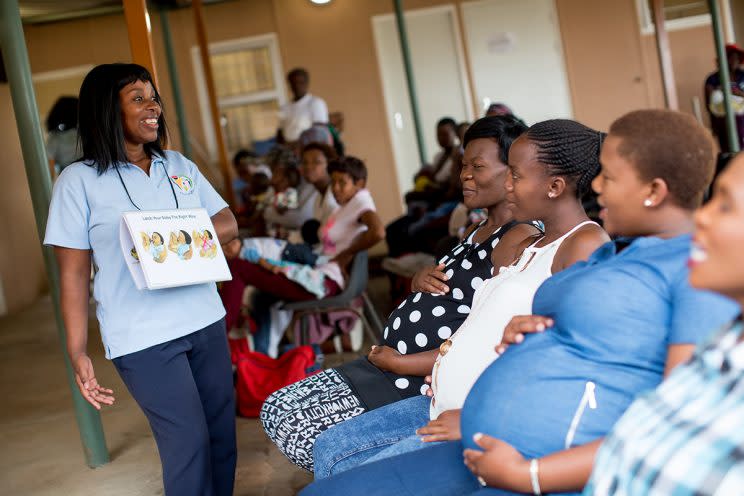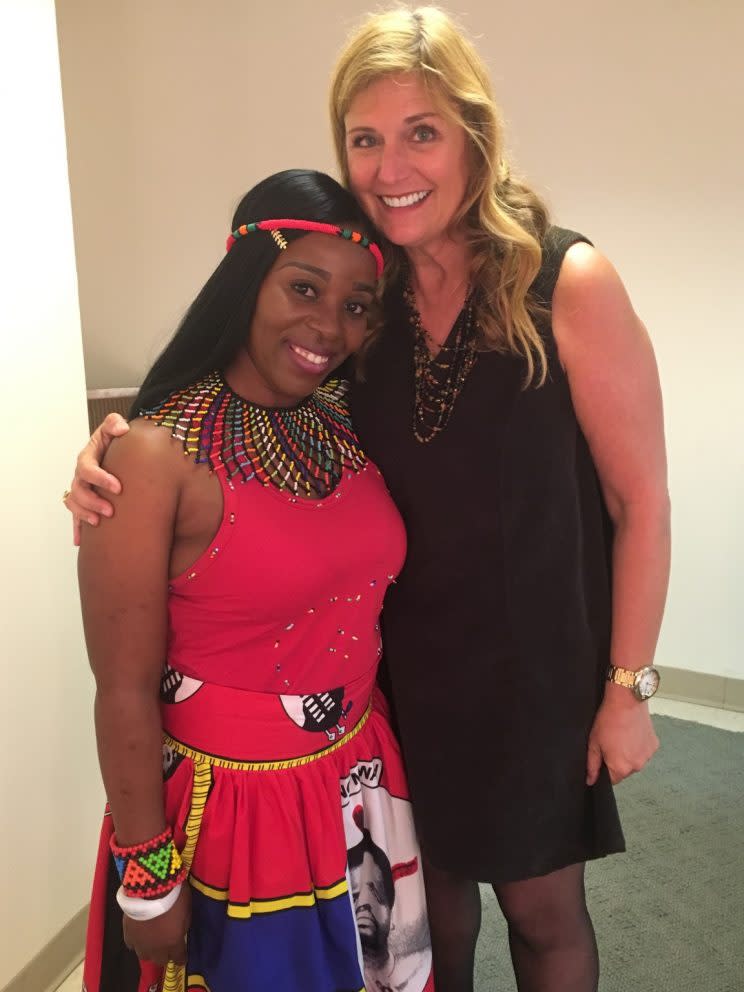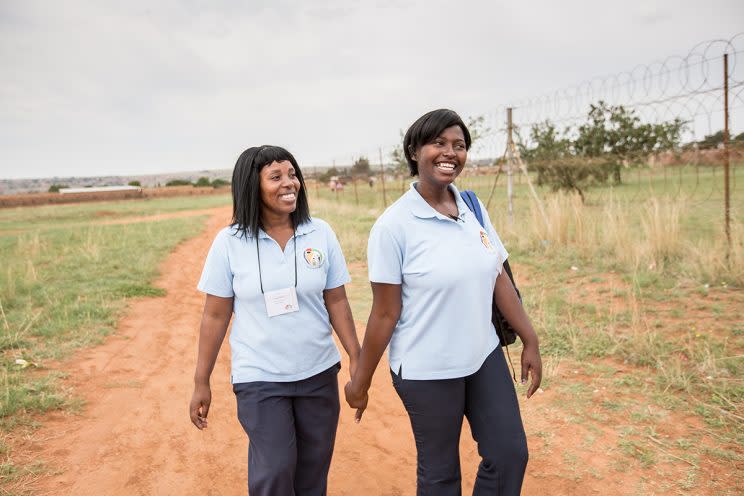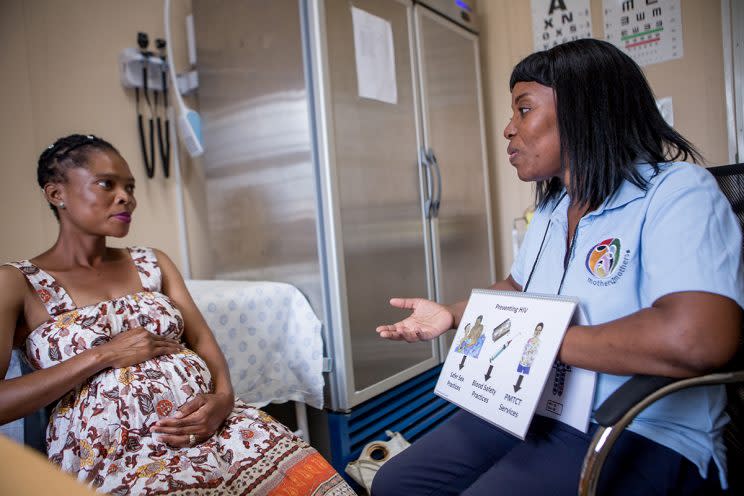After HIV Stigma Killed Her Baby, Mom on Mission to End Pediatric AIDS

When Irene Nkosi of South Africa was just 15 years old, she gave birth for the first time. But it was not the young woman’s first hardship —she had already been raped, contracted HIV, and been largely shunned in her community because of it — and it would not be her last. Soon she would give birth a second time, to a daughter, but the child would die before reaching her first birthday.
“Her name was Mbali. It means flower,” Nkosi, 32, told Yahoo Beauty on a recent morning in New York City. “She was beautiful.”
Nkosi had just spoken onstage at the annual U.N.’s Mom + SocialGood Summit about her quietly revolutionary job with Mothers2Mothers (m2m) in her home city of Victoria. Through its determined army of 1,700 Mentor Mothers like Nkosi, who lend sister-like support to pregnant women and educate them about HIV, m2m aims to end the transmission of mom-to-baby pediatric AIDS in sub-Saharan Africa — where 300 infants are born with HIV each day, compared with the 200 per year in the United States.
Baby Mbali was not HIV-positive — nor is her older sister — but those who knew Nkosi’s status assumed that both children were. And they held that perceived status against the children — particularly Mbali, who died at just 8 months old as the result of her neglect at daycare.

“That morning she was bubbly, laughing, but later on the principal came to me and said my daughter was not well,” Nkosi recalls. When she met her daughter and a staffer at a medical clinic, she was told her daughter was sleeping. “But she was not moving, and when I looked at her, I could see her lips had turned blue,” she says. The adult who had taken her in for care did not treat the situation as an emergency, choosing instead to stand in a long queue.
But when Nkosi held her daughter, she felt that she was cold and lifeless. The doctor, she recalls, told her, “The child died eight hours ago.” It turns out that she’d been lying underneath a blanket and had suffocated to death, as everyone was afraid to touch her because of fears that she was HIV-positive.
It was a persistent stigma that had ultimately killed Mbali — something confirmed when the head of the daycare showed up at Nkosi’s home to offer condolences but instead delivered harsh words. “I remember she came to me and said to me, ‘You knew you were HIV-positive. Why were you bringing the child to daycare? Did you want to infect other children?’ I felt I want to beat this woman up because of what she said,” Nkosi says. “But my mom said, ‘Forgive them. God will answer for you.'”
It was not long, though, before Nkosi started to answer for herself, through her work as a mentoring mother at m2m — an opportunity she found out about during a prenatal checkup when she was still pregnant with Mbali, feeling suicidal because of the stigma against her. She was incredulous that anyone would value an HIV-positive woman, let alone hire her for a job, but she applied and began a training program, soaking up the knowledge about transmission and slowly regaining her life and sense of worth.

“Mothers2mothers was a lifesaver for me, because they came through while I was in a tough time, and I decided I should be the living example for other women through the pain I’m feeling,” she explains. “I don’t want to see another woman in the same pain that I’m feeling, losing her child because of HIV and lack of knowledge.”
For organization co-founder Robin Smalley, who gave birth to the idea along with ob-gyn Mitch Besser in 2001, m2m also provided purpose for her at a difficult period. “It also saved my life,” she tells Yahoo Beauty.
That’s because Smalley, a TV producer at the time, was hit with a quick succession of devastations — the death of the stepfather who raised her, a breast cancer diagnosis, the sudden death of her mother, and then the loss of her best friend from college, who had gone into a coma during minor surgery.
While sitting at her friend’s hospital bed with Besser — the friend’s brother — she learned about the overwhelming problem of pediatric AIDS in South Africa, which is where Besser was working as a doctor. And Smalley, who had recently made the transition into nonprofit work, was intrigued. Still, when her friend wound up dying, she recalls, “I went into a tailspin. I was basically pulling the covers over my head. And Mitch said, ‘Come to Cape Town and see what I’m doing.'”
She made herself go and spent a day going on rounds with him as he treated HIV-positive mothers, and that was it.
“I fell head over heels for the women I met — the grace and the courage and the humor and spirit,” Smalley recalls, “and for me, it was like a bucket of cold water to get over my self-pity. I called my husband that night and said, ‘I want to do this,’ and … four weeks later we picked up the kids [4 and 12 at the time] and dogs and moved to Cape Town, and started this out of the back of his car.”

Mothers2Mothers is, she says, “a very simple solution to what was considered a complicated problem, which was ending pediatric AIDS.” And it’s been successful, in that the program has gotten the transmission rate down to 2.1 percent — well below the 5 percent that’s mandated by the World Health Organization for the elimination of pediatric AIDS, she says. Daily treatments keep down viral loads during pregnancy and breastfeeding, when transmission from mother to baby is, contrary to popular belief, far from a given.
The organization has gone about its mission by hiring new mothers who are HIV-positive to go through a training program and then sending them into the field to empower other pregnant HIV-positive women through mentoring and education. That, in turn, spreads awareness that is slowly ending the stigma that led to the death of Nkosi’s daughter.
“We realized there’s no better resource in Africa than the mothers themselves,” Smalley notes, explaining that the countries suffer from a dangerous lack of medical care. “It’s nothing like here … Mozambique has three doctors and 21 nurses for every 100,000 people,” she says. “Clinics and hospitals can be very scary places. The first time I ever saw a woman deliver, she was in heavy labor and the nurse hauled off and whacked her across the head! They call it a ‘klop’ — it’s common; it’s like, ‘hurry up I need the bed.’ So it’s not like, ‘Do I want Bach or Beethoven at my birth?'”
While mentoring mothers aren’t allowed in the birth rooms at clinics because of the lack of space, they provide a feeling of support and security leading up to the birth and right after. “Immediately,” says Smalley, “there’s a Mentor Mother there to put her arms around you to say, ‘You’re not alone; I’m HIV-positive too, and we’ll get through this together.'”
Smalley is emphatic when she says, “We know how to end pediatric AIDS. There’s not a reason why any child anywhere in the world should be born HIV-positive. Where you live should not determine if you live.”
As for Nkosi, she feels blessed to have found m2m and has come a long way from when the stigma of being HIV-positive felt crippling. “When I passed by people on the street and they were laughing, I would think they were laughing at me,” she recalls. When she was welcomed by the women at m2m, she thought, How can they be hugging and kissing me? Do they want to die? When she learned the facts about transmission — that it is not spread by hugging or kissing or sharing food but through bodily fluids including blood and semen — she was eager to share that knowledge with everyone she knew. “Then they started preaching the word outside, and everyone started understanding, and the stigma slowly but surely started to end,” Nkosi says.
She has also met an understanding man, also HIV-positive, and together they’ve had a child, now 4, who is healthy and HIV-negative. Nkosi and her partner support each other in staying healthy, she says, adding, “It’s rare to meet a man like that.” Smalley agrees, noting, “This is a particularly happy ending.”
Read more from Yahoo Beauty + Style:
‘Vanity Bonded Me to My Elegant Mother When I Was Young. But Then She Fell From Grace’
Motherhood Doesn’t Look as Glamorous as I’d Hoped. But I’m in a Battle for my Children’s Lives
Follow us on Instagram, Facebook, and Pinterest for nonstop inspiration delivered fresh to your feed, every day. For Twitter updates, follow @YahooStyle and @YahooBeauty.

